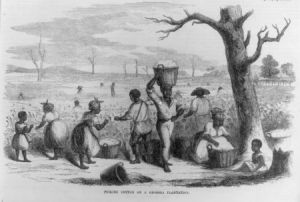 With increasing frequency and fervency, Southern Baptists are struggling to reconcile rapidly-declining Confederate fortunes with their faith in the God of the Confederacy. Obviously, God is punishing the white race of the South.
With increasing frequency and fervency, Southern Baptists are struggling to reconcile rapidly-declining Confederate fortunes with their faith in the God of the Confederacy. Obviously, God is punishing the white race of the South.
For much of the war, many cries of repentance and promises of changed behavior have been voiced. Some have even dared to declare that white slaveowners should treat their chattel more humanely. Not once, however, has a Southern Baptist leader or newspaper editor suggested that African slavery could possibly be sin in an of itself. Quite the opposite in fact: constant is the refrain that African slavery is ordained of God and that the responsibility of whites is to fight for the African slavery while using their slaves wisely.
A editorial by Samuel Boykin published in today’s Georgia Baptist Christian Index offers the latest words of contrition and seeks to clear up the confusion.
The “mysterious providences of God” sometimes take the form of “punishment” for the “delinquencies” of his chosen ones, Boykin reminds his readers. Chastisement at the hand of God is designed to develop “national character and resources for those whom he thus afflicts” in order to effect the fulfillment of persons’ pre-determined “mission.”
….assuredly, is God leading us through dark and gloomy paths–where the trees drop sadness and moans fill the valleys–to the accomplishment of high and holy purposes. What those purposes are we know not. But, of a verity, they must, in some wise be connected with the dark sons of Ham, whose lot has been apparently so providentially cast amongst us, and whose presence, in a servile condition, aroused at the North, that insane fanaticism, whose infidel ravings and iniquiteus workings brought about this unholy war. In regard to these slaves of ours, however, we can firmly plant ourselves upon the word of divine truth, and upon the enactments of God himself concerning them, and “smile at Satan’s rage and face a frowning world,” provided we leave not undone the duties assigned by Him who placed them here.
That slavery is sanctioned by the Bible seems scarcely to admit of a doubt. Founded on the divine decree that “Canaan should be a servant of servants unto his brethren;” existing in the days of the patriarchs; twice spoken of in the ten commandments; with laws written in the New Testament for its regulation, it stands as an institution of God himself. And when men “whose minds are corrupted, and who are destitute of the truth; and who, blinded with pride understand nothing,” fly in the face of the God of Providence and endeavor to thwart his mighty plans by abolitionist schemes, it is but simple faith in the goodness, wisdom and power of God to believe that He will vindicate the honor of His word, the rectitude of His institution and wisdom of His providence by overwhelming these impious attempts to destroy what He has established, and will confound those men who seek to be more wise and more righteous than their maker.
For this purpose He has cut us off from all political association with them, and held us back from all entangling alliances with other nations, so that guided by His hand we may rise up to future greatness, and show to the world in all coming time that God was right when He instituted slavery among men; that it is the best form of human society; that it coexists with the true happiness of both master and servant; that in it He has solved the great problem which had baffled the wisdom of man, reconciled the long conflict of capital and labor, thus giving social order and peace to the world, never again to be disturbed by the insane fanaticism of man. For such a mission God is preparing us….
In order to fulfill their God-given mission of perpetuating African slavery, Boykin argues that white southerners must repent and cease from extortion in a fragile economy, must pray more earnestly, and must not neglect the “moral culture of our slaves…in short, our using them [slaves] for own aggrandizement rather than for carrying out the purposes of Jehovah….”
Hence, even as the Confederacy is sinking in the war over African slavery, Boykin cries all the louder for white Southerners to remain committed to the institution of African slavery, leaving no room for the possibility that God wills freedom for black human beings.
Source: Samuel Boykin, “He Maketh Wars to Cease,” Christian Index, November 20, 1863


